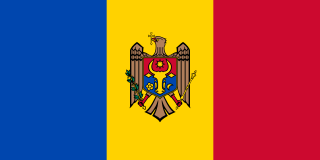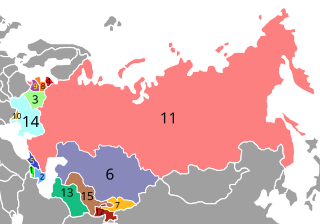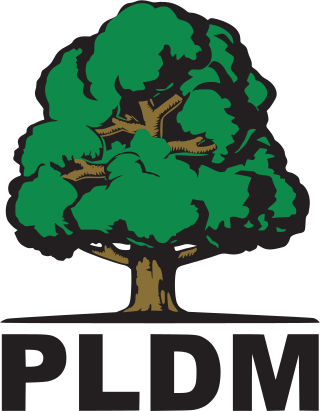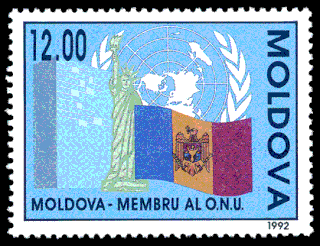Contents
This article needs additional citations for verification .(July 2018) |
| |||||
| Decades: | |||||
|---|---|---|---|---|---|
| See also: | |||||
Events in the year 2001 in Moldova .
This article needs additional citations for verification .(July 2018) |
| |||||
| Decades: | |||||
|---|---|---|---|---|---|
| See also: | |||||
Events in the year 2001 in Moldova .
The history of Moldova spans prehistoric cultures, ancient and medieval empires, and periods of foreign rule and modern independence.

The politics of Moldova take place in a framework of a parliamentary representative democratic republic, wherein the prime minister is the head of the Government of Moldova, and a multi-party system. The President of Moldova has no important powers. The government exercises executive power while the legislative power is vested in the Parliament. The judiciary is independent of the executive and the legislature. The position of the breakaway region of Transnistria, relations with Romania and with Russia, and integration into the EU dominate political discussions.

After achieving independence from the Soviet Union, the Republic of Moldova established relations with other European countries. A course for European Union integration and neutrality define the country's foreign policy guidelines.

Moldova, officially the Republic of Moldova, is a landlocked country in Eastern Europe, on the northeastern corner of the Balkans. The country spans a total of 33,483 km2 (12,928 sq mi) and has a population of approximately 2.42 million as of January 2024. Moldova is bordered by Romania to the west and Ukraine to the north, east, and south. The unrecognised breakaway state of Transnistria lies across the Dniester river on the country's eastern border with Ukraine. Moldova is a unitary parliamentary representative democratic republic with its capital in Chișinău, the country's largest city and main cultural and commercial centre.

The Commonwealth of Independent States (CIS) is a regional intergovernmental organization in Eurasia. It was formed following the dissolution of the Soviet Union in 1991, and is its legal successor. It covers an area of 20,368,759 km2 (7,864,422 sq mi) and has an estimated population of 239,796,010. The CIS encourages cooperation in economic, political, and military affairs and has certain powers relating to the coordination of trade, finance, lawmaking, and security, including cross-border crime prevention.

Gagauzia or Gagauz-Yeri, officially the Autonomous Territorial Unit of Gagauzia (ATUG), is an autonomous territorial unit of Moldova. Its autonomy is intended for the local Gagauz people, a Turkic-speaking, primarily Orthodox Christian ethnic group.

Vasile Tarlev is a Moldovan politician.

The politics of Transnistria, an unrecognised de facto state situated de jure within the Republic of Moldova in Eastern Europe, take place in a framework of a semi-presidential republic, whereby the president is head of state and the prime minister is head of government. Executive power is exercised by the government. Legislative power is vested in both the government and parliament. Officially, Transnistria has a multi-party system and a unicameral parliament, called the Supreme Council. The president is elected by popular vote. The latest parliamentary elections were held in November 2020.

The post-Soviet states, also referred to as the former Soviet Union (FSU) or the former Soviet republics, are the independent sovereign states that emerged/re-emerged from the dissolution of the Soviet Union in 1991. Prior to their independence, they existed as Union Republics, which were the top-level constituents of the Soviet Union. There are 15 post-Soviet states in total: Armenia, Azerbaijan, Belarus, Estonia, Georgia, Kazakhstan, Kyrgyzstan, Latvia, Lithuania, Moldova, Russia, Tajikistan, Turkmenistan, Ukraine, and Uzbekistan. Each of these countries succeeded their respective Union Republics: the Armenian SSR, the Azerbaijan SSR, the Byelorussian SSR, the Estonian SSR, the Georgian SSR, the Kazakh SSR, the Kirghiz SSR, the Latvian SSR, the Lithuanian SSR, the Moldavian SSR, the Russian SFSR, the Tajik SSR, the Turkmen SSR, the Ukrainian SSR, and the Uzbek SSR. In Russia, the term "near abroad" is sometimes used to refer to the post-Soviet states other than Russia.

The European Social Democratic Party is a centre-left, populist social-democratic political party in Moldova. Established in 1997, the party holds pro-European views, and is an associate member of the Party of European Socialists (PES) and a full member of the Socialist International. According to its statute, the PSDE pleads that Moldova is an independent, sovereign, and democratic state, based on law, and integrated in the united family of European democracies. Reflecting former leader Marian Lupu's views, but also the strong influence of the Moldovan Orthodox Church, the party is more conservative on social issues, such as LGBT rights.

The Social Democratic Party is an extra-parliamentary political party in Moldova currently led by Victor Șelin.

The Parliament of Moldova is the supreme representative body of the Republic of Moldova, the only state legislative authority, being a unicameral structure composed of 101 elected MPs on lists, for a period or legislature of four years. The Parliament of Moldova is elected by universal vote, equal directly, secret and freely expressed. The president of the Parliament of the Republic of Moldova is elected by the Parliament, with a minimum of 52 votes.

Serafim Urechean is a Moldovan politician. He held the position of general mayor of Chișinău municipality (1994–2005) and interim prime minister of the Republic of Moldova. He was the chairman of the party Our Moldova Alliance (2003–2011), first deputy chairman of the Parliament of the Republic of Moldova (2009–2010) and president of the Court of Accounts of the Republic of Moldova (2011–2016).

The Liberal Democratic Party of Moldova is a conservative political party in Moldova. The party is led by Tudor Deliu. Until 2016, PLDM was led by Vlad Filat, who was Prime Minister of Moldova from 2009 to 2013, in two cabinets. Immediately after the 2014 parliamentary elections, with 21 seats in the Moldovan Parliament, PLDM was the largest of the three democratic pro-European parliamentary parties.

Marian Lupu is a Moldovan economist and politician who was the President of the Parliament of Moldova between 2010 and 2013. From this position he served as Acting President of Moldova from 2010 until 2012.

Moldova–Slovenia relations are the bilateral relations between Moldova and Slovenia. Moldova recognized the Republic of Slovenia under an unknown date. Diplomatic relations were established on October 27, 1993. Both countries are represented in each other through their embassies in Budapest (Hungary). Slovenia is a member of the European Union, which Moldova applied for in 2022. Both countries are full members of the Council of Europe.

The following is timeline of the History of independent Moldova which started after the independence of Moldova.

Iurie Leancă is a Moldovan politician who was the prime minister of Moldova from 2013 until 2015. He was Minister of Foreign Affairs and European Integration from 2009 to 2013 as part of the First and Second Filat Cabinet.
Vasile Ursu is a Moldovan engineer and politician, MP at the first Parliament of the Republic of Moldova in 1990-1994, acting interim general mayor of Chișinău in 2005-2007 and minister of transport and road management for 2007-2008. In 2008-2009 he held the position of Deputy Minister of Construction and Territory Development.

Victor Șelin is a Moldovan businessman, politician, and former journalist, currently president of the Social Democratic Party of Moldova.